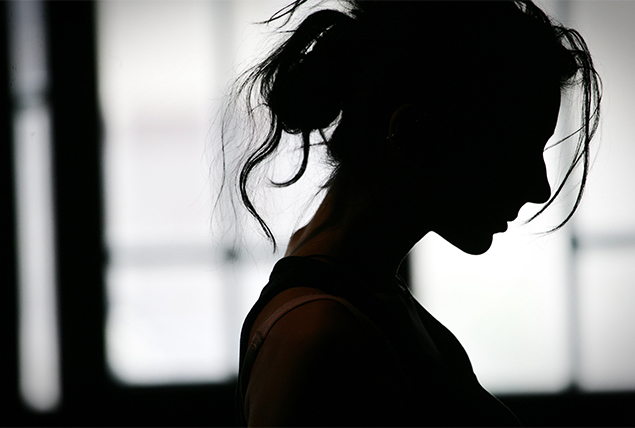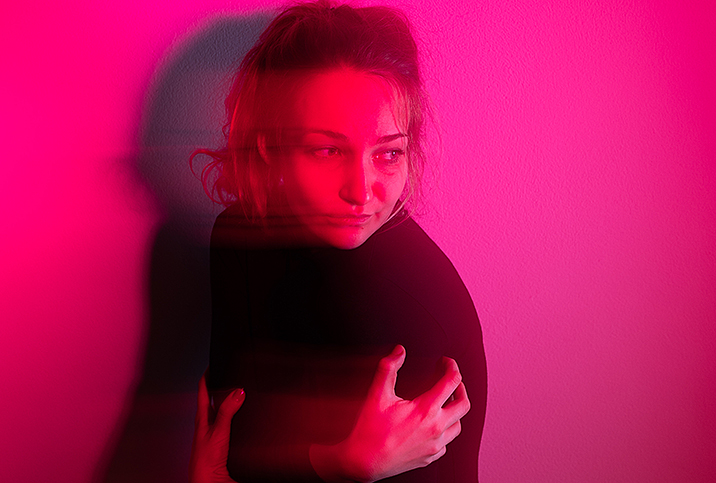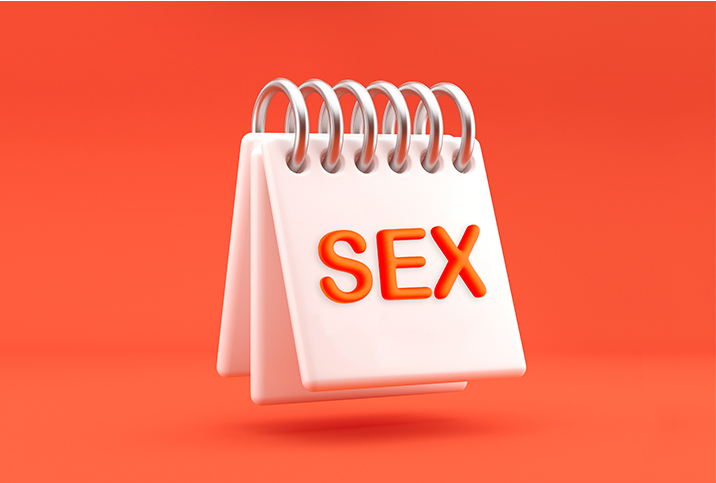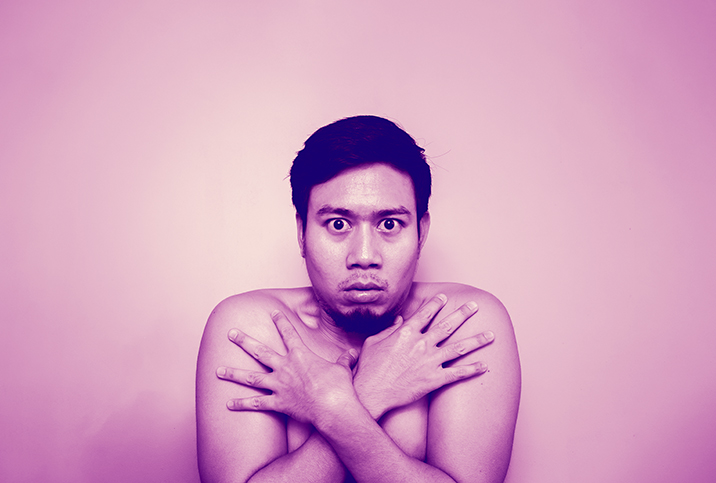Can You Have a Healthy Sex Life With Anxiety?

It wasn't long ago that mental health disorders were rarely spoken of, aside from conversations within close-knit circles of friends, family and loved ones.
Fortunately, in recent years, discussions of many mental health conditions have become part of everyday conversation, with much of the stigma surrounding them beginning to fade away.
As more and more people feel comfortable discussing their challenges with anxiety, it has become apparent that there is often confusion about the differences between general anxiety and clinical anxiety disorders.
In other words, how do you know if you are suffering from a mild, fleeting bout of anxiety versus a clinical anxiety disorder? What are the signs and symptoms to look out for? Is it possible to experience anxiety without it getting serious? More than all of that, how can anxiety affect your life, your sexual health and your relationships?
What's the difference between feeling anxious and having an anxiety disorder?
People naturally experience anxiety in reaction to stress or perceived dangers. That is common, said Tom Murray, Ph.D., a certified sex therapist based in Greensboro, North Carolina, and author of the book "Making Nice with Naughty: An Intimacy Guide for the Rule-Following, Organized, Perfectionist, Practical, and Color-Within-The-Line Types."
"Anxiety is characterized by emotions of dread, concern, uneasiness or terror toward upcoming occasions or circumstances," Murray said. "In addition to psychological symptoms like racing thoughts, trouble focusing and impatience, anxiety may also show itself as physical symptoms including perspiration and restlessness. While some worry is natural, severe or persistent anxiety that interferes with everyday living may be a sign of an anxiety disorder."
Anxiety is a basic human emotion we all experience when our bodies anticipate a threat or danger, said Elena Touroni, Psy.D., a consultant psychologist and co-founder of The Chelsea Psychology Clinic with three locations in London.
"For various reasons, people can miscalculate the danger of a situation and may end up experiencing anxiety that is out of proportion to what's actually happening," she said. "This is when anxiety moves from a healthy response to being an anxiety disorder."
Anxiety is characterized by emotions of dread, concern, uneasiness or terror toward upcoming occasions or circumstances.
Murray said an important thing to keep in mind is that "anxiety disorder" is not an official diagnosis and is actually an umbrella term that includes various types of diagnoses, such as generalized anxiety disorder (GAD), separation anxiety disorder (SAD), and phobic disorder or panic disorder.
"These diagnoses vary depending on the object of the anxiety or the situation that triggers the fear, anxiety or avoidance behaviors," Murray said. "What all psychiatric disorders have in common, according to the DSM-5 (Diagnostic and Statistical Manual of Mental Disorders, Fifth Edition), is that they cause 'clinically significant distress or impairment in social, academic, occupational or other important areas of functioning.' Therefore, one can experience anxiety but not experience clinically significant distress or impairment."
Anxiety as a symptom and clinical anxiety disorders can accompany depression, but the two are separate diagnoses, according to Craig N. Sawchuk, Ph.D., L.P., a professor of psychology at Mayo Clinic.
"Anxiety may occur as a symptom of clinical (major) depression," he said. "It's also common to have depression that's triggered by an anxiety disorder, such as generalized anxiety disorder, panic disorder or separation anxiety disorder. Many people have a diagnosis of both an anxiety disorder and clinical depression."
Why do some people feel more anxious at night?
Anxiety can be situational, which means it appears in certain circumstances such as when you have to speak in front of other people, fly somewhere or experience concerning medical symptoms. There can be temporal factors that make anxiety spike at different parts of the day.
"Some people find that their anxiety ramps up at nighttime," Touroni said. "This is because we usually have fewer distractions during the night, which can make it easier to ruminate over what happened that day and what we need to do for the day ahead."
Murray said many of the benefits of sleep occur in the phase of sleep known as rapid eye movement (REM), which is when we experience dreams. The restoration and recuperation of the body are associated with REM sleep.
"The brain is quite busy at this time, and significant physiological processes take place," he said. "REM sleep aids in tissue healing, encourages cell growth and regeneration, and fortifies the immune system. REM sleep is crucial for the health and efficiency of the brain. It is involved in learning, processing emotions and consolidating memories. For the brain to function at its best and for people to pay attention and concentrate, they need enough REM sleep."
'A therapist will help you unravel where your anxiety stems from and teach you healthier coping mechanisms so it doesn't interfere with your relationships and day-to-day life.'
Many of the body's hormones are regulated during REM sleep, including growth hormone (good for tissue development and repair) and cortisol (helps with metabolism and stress response), he added.
"Energy conservation is also linked to REM sleep," Murray said. "Although the precise processes are not entirely known, it is thought that REM sleep aids in energy restoration and keeps the body's metabolism in balance."
Lack of REM sleep has been linked to increased emotional reactivity, irritation and mood problems since it is crucial in processing and regulating emotions. REM sleep disruptions have been associated with an increased risk of cardiovascular diseases such as heart disease and hypertension (high blood pressure).
"Enough REM sleep is necessary to keep the cardiovascular system in good shape," Murray said. "REM sleep may affect how people perceive and cope with pain. According to research, REM sleep interruptions may cause an increase in pain sensitivity and a reduction in pain tolerance."
How does anxiety affect libido and sex life?
Anxiety can interfere with libido, sexual performance and intimate relationships in a number of ways.
"Anxiety is largely associated with distressing thoughts about the future, whereas depression is associated with an over-focus on the past," Murray said. "Anxiety, with its production of cortisol and adrenaline, can interfere with sexual receptivity and sexual arousal. Anxiety causes blood flow to constrict and concentrate in the core, relatively speaking. Sexual arousal, whether the engorgement of the penis or vulva, requires blood flow to those regions."
If someone has contextual desire, they're more prone to be impacted by anxiety than someone with spontaneous desire.
"Contextual desire is the idea that a person's surroundings and circumstances—such as environmental signals and variables as well as intrinsic or spontaneous emotions of arousal—influence desire," Murray said. "Spontaneous desire is where someone may experience sexual interest independent of what's going on around them."
Interestingly, anxiety stifles libido and passion for some people, but other people find that having mild anxiety acts as "fuel" for sexual desire and performance, he added. As an example, some people get particularly horny when they're stressed.
"It's crucial to keep in mind that many individuals turn to sex and masturbation as a stress reliever," he said. "This is because having sex and masturbating may increase your mood by releasing endorphins and oxytocin, and even simply thinking about having sex can make your brain produce dopamine, which makes you feel good."
Plus, sex, masturbation, watching porn or listening to audio-erotica can be used as diversionary strategies or to escape from stressful or anxious sensations.
Can you have a healthy sex life with anxiety?
Too many people with anxiety often take the approach of "sucking it up" or hoping it goes away, but Touroni said there is plenty of support, including for sexual health.
"If you find that your anxiety is interfering with your ability to have a healthy sex life, I would encourage you to reach out to a therapist," she said. "A therapist will help you unravel where your anxiety stems from and teach you healthier coping mechanisms so it doesn't interfere with your relationships and day-to-day life."
Murray includes a number of cognitive strategies for loosening the grip of anxiety in his book. One example, from his research and clinical practice, is to make friends with your anxiety, which is a shift in thinking.
"Most people treat anxiety like it's an enemy, and there's very little evidence that this helps," he said. "People prone to anxiety are also encouraged to identify whether they've succumbed to the various forms of sexual perfectionism."
He identified those forms as follows:
- "I think I have to be sexually perfect."
- "I think my partner has to be sexually perfect.
- "I think my partner thinks I have to be sexually perfect.
- "Society expects me to be sexually perfect."
Murray said falling prey to sexual perfectionism is the type of thinking that often exacerbates anxiety surrounding sex and the negative implications of anxiety on libido and sexual performance.


















